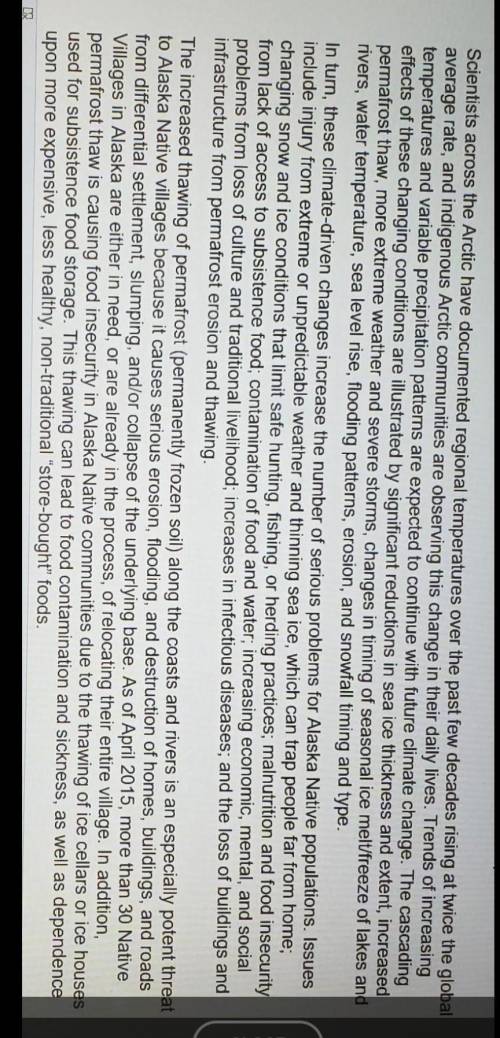
Write a summary of " Tribal Nations: Climate Change Threatens Traditional Ways of Life." Include the central idea and the main supporting ideas of the essay. Include significant details: omit unimportant details. Summarize the details. Summarize the ideas and details in order in which they appear in the easy. It can help to create a prewriting outline to get organized. In your outline, write 1-2 sentences for each paragraph in the essay. Remember, use your own words in your summary. [ Read Story -> " Tribal Nations: Climate Change Threatens Traditional Ways of Life ") Of the 2.5 million American Indians and Alaska Natives registered in the U. S. Census, approximately 1.1 million live on or near reservations or native lands, located mostly in the Northwest, Southwest, Great Plains. and Alaska, although indigenous communities can be found throughout the U. S. Climate change poses particular threats to indigenous culture, well-being, and ways of life in every region of the United states. Chronic stresses such as extreme poverty are being exacerbated by climate change impacts: these impacts include reduced access to traditional foods, decreased water quality, and increasing exposure to health and safety hazards. In Alaska, Maine, the Pacific Northwest, and other coastal locations, erosion and inundation related to climate change are so severe that some communities are already relocating from historical homelands to which their traditions and cultural identities are tied. Climate change impacts Tribal Nations' access to Traditional foods. Fare such as salmon, shellfish, crops, and marine mammals have provided sustenance as well as cultural, economic, medicinal and community health for countless generations. Some plants used for medicines and food are becoming increasingly difficult to find, or are no longer found in historical ranges. Subsequentshifts from Traditional lifestyles and diet -compounded by persistent poverty, food insecurity, the cost of non-traditional foods, and poor housing conditions---have led to increasing health problems in native communities. Climate change is likely to amplify other indirect effects to traditional foods and resources, including limited access to gathering places, hunting grounds, and environmental portion. A key uncertainty is how indigenous people will adapt to climate change, given their reliance on local, wild foods and the geographic isolation of some communities. For example , increased wildfire frequency and intensity due to fuel loading brought on by drought and other factors may affect tribal homes, safety, economy, culturally important species, medicinal plants, traditional foods, and cultural sites. Additionally, tribes have varying levels of preparedness and some have a limited ability to cope with extreme events. Climate change also affects the integrity and stability of the ecosystems on which indigenous peoples depend by altering ecosystems processes and biodiversity. Ecosystems provide a rich array of benefits and services including habitat for fish and wildlife, drinking water storage and filtration, fertile soils for growing crops, buffering against a range of stressor, and aesthetic and cultural values. Changes in these resources have social, cultural. and economic effects on native communities in part. Events such as droughts, floods, wildfires, and pest outbreaks associated with climate change ( for example, bark beetles in the West and Alaska) are already disrupting ecosystems. In the longer term, there is increasing risk of species extinction, which could be particularly devastating to native communities reliant on specific for food, medince, and ceremonies. Decreases in water quality and quanity are effecting Native Americans' drinking water supplies, food, cultures, ceremonies, and traditional way of life. Native communities ' vulnerabilities and lack of capacity to adapt to climate change are exacerbated by historical and contemporary federal and state land- use policies and practices, political marginalization, legal issues associated with tribal water rights, water infrastructure deficiencies, and poor socioeconomic conditions. ( I Posted A Picture Of The Last 3 Paragraphs ) Will Mark Brainliest.


Answers: 2


Another question on English

English, 21.06.2019 15:30
Three types of literature characteristics of the twelfth century are ? sonnets, histories, ballads, elegies, lyrics. select all that apply.
Answers: 1

English, 21.06.2019 21:00
Why should college athletes not get paid for play claim: state the point of a of why they shouldn't then direct quotation to support why they shouldn't then explain a point b then direct quotation to support point b that you just answered above
Answers: 1

English, 21.06.2019 23:10
Question 5 the poet protests against child labor and condemns the harm done to children exploited in this practice. yet in lines 23-24, the child narrator writes that “tho' the morning was cold, tom was happy and warm / so if all do their duty, they need not fear harm.” this is an ironic expression of the narrator’s
Answers: 1

English, 21.06.2019 23:30
Which statement best summarizes this excerpt from leo tolstoy's the death of ivan ilyich? and in imagination he began to recall the best moments of his pleasant life. but strange to say none of those best moments of his pleasant life now seemed at all what they had then seemed—none of them except the first recollections of childhood. there, in childhood, there had been something really pleasant with which it would be possible to live if it could return. but the child who had experienced that happiness existed no longer, it was like a reminiscence of somebody else.
Answers: 2
You know the right answer?
Write a summary of " Tribal Nations: Climate Change Threatens Traditional Ways of Life." Include the...
Questions



Mathematics, 18.05.2021 18:00

Mathematics, 18.05.2021 18:00



History, 18.05.2021 18:00

Mathematics, 18.05.2021 18:00



Mathematics, 18.05.2021 18:00


English, 18.05.2021 18:00

English, 18.05.2021 18:00

Biology, 18.05.2021 18:00


Mathematics, 18.05.2021 18:00


Health, 18.05.2021 18:00

Mathematics, 18.05.2021 18:00




